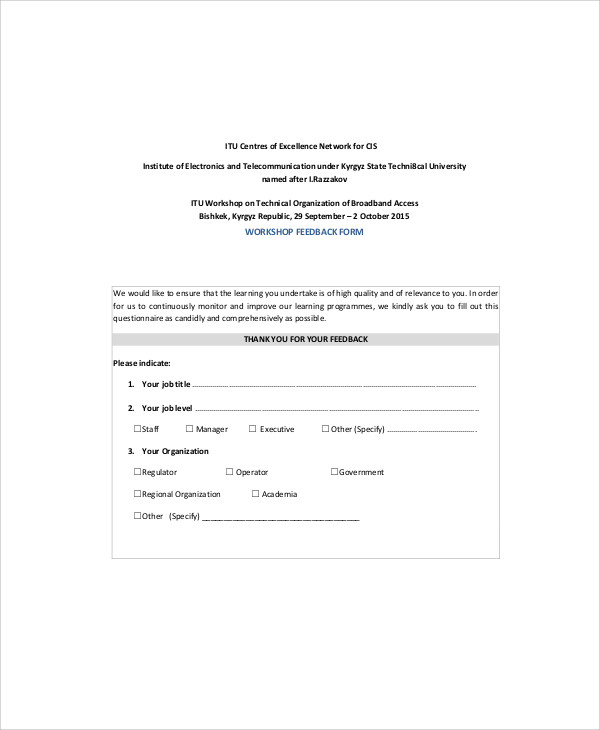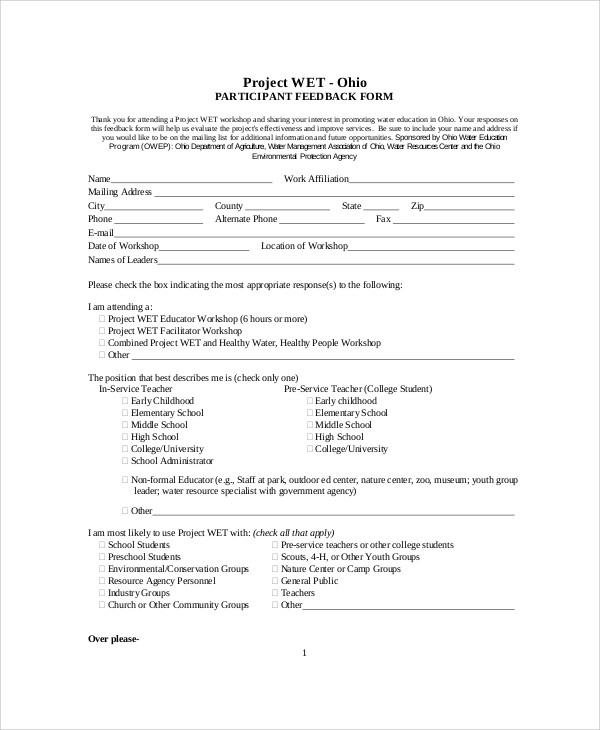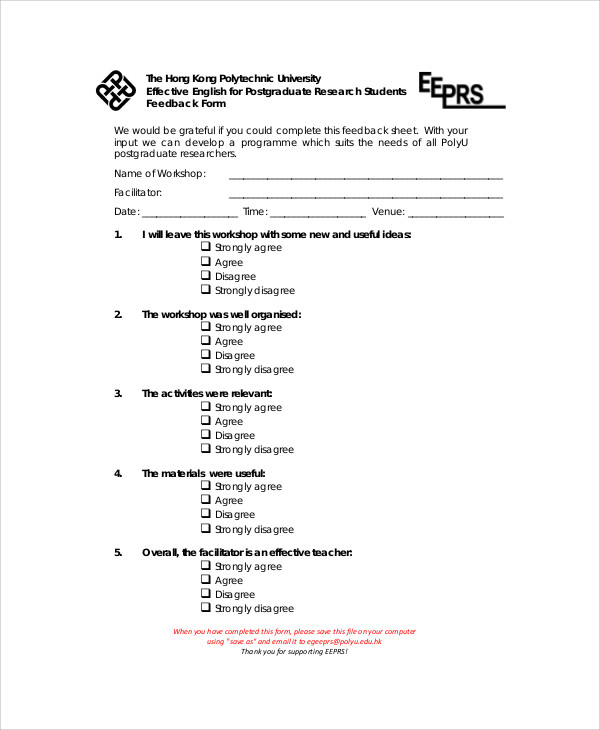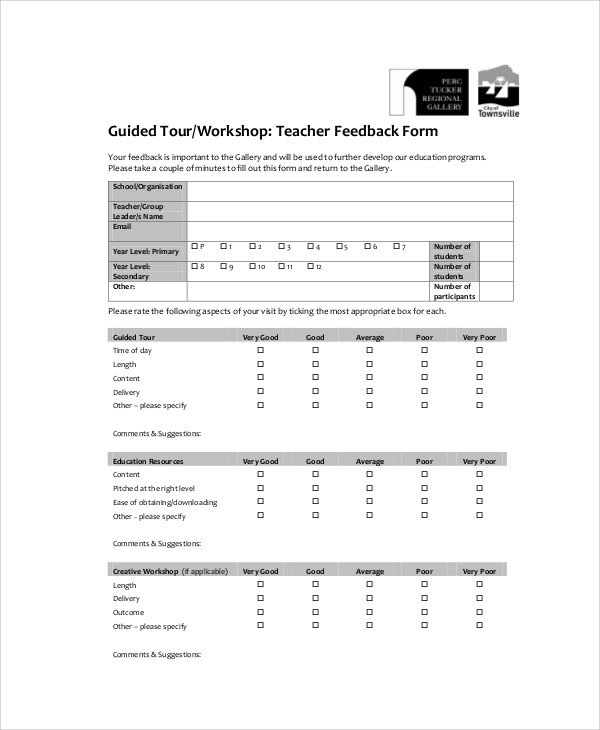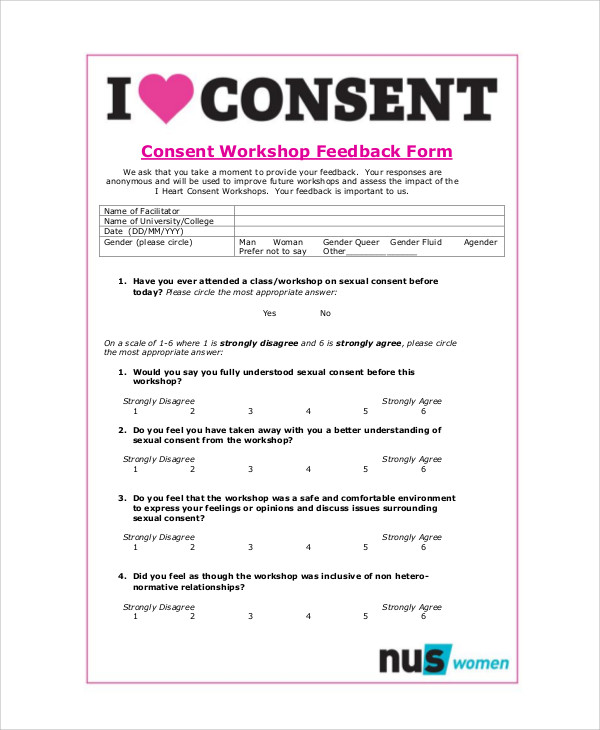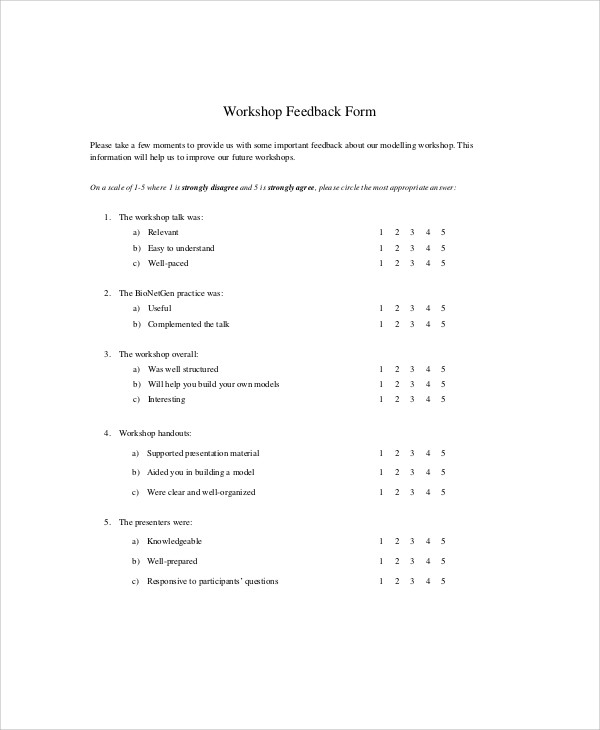Workshops come in many forms and methods. Sometimes, it involves interaction between the trainer and the participants or between the participants with each other. These are the more active workshops where the participants experience experiential learning. This is where they play games and, with the help of the facilitator, they explore the learnings they acquired from the activity. There are also workshops that are more of a sit-down, listen to the lecturer workshop where the participants learn the way they would in class. Some workshops are a combination of the two. See these Sample Forms to help you assess the effectivity of your workshops.
Workshop Feedback Form Example
Workshop Participant Feedback Form
Workshop Feedback Form in PDF
Teacher Workshop Feedback Form
A workshop facilitator’s job extends from before to way after the workshop ends. No two workshops would be exactly alike because workshops are personalized to the needs and learning style of its participants. Thus, participating in a workshop is a great way to acquire knowledge and skill, and cultivate self-awareness.
Why You Should Get Feedback
Sometimes, when working too closely on a task, you might miss a couple of details or fail to consider certain options. When planning a workshop, you make a lot of decisions that would make the difference between an effective training or one that did not reach its objectives. When you’re conducting a workshop, you have to consider the different personalities of each participant and weave your training to fit each of them. Just as Presentation Feedback Forms are used as a means of understanding the reason behind the audiences’ reactions to it, workshops need feedback as a way to explain the outcomes of training.
Purpose of Getting Feedback
Aside from using feedback as an attempt to answer the “whys” of your training, here are some more reasons why getting feedback for a workshop is important:
- Proof of Added Value Due to Training. The results of the training feedback will provide you with real, numerical proof of the value your training has provided in meeting the goals of your clients or the participants.
-
Helps in Determining Areas of Improvement. A Coach Feedback Form would be given to athletes to determine strength and weaknesses in the coach’s method. Knowing what works for their athletes would help the coach be more effective in his job. Not unlike this, a workshop facilitator would also need feedback to gauge what works, what doesn’t, and what simply needs a bit of modification. With the perspective of the people who are on the receiving end of training, a facilitator may be able to find holes that could be filled out in his training design.
Consent Workshop Feedback Form
Generic Workshop Feedback Form
Example Workshop Feedback Form
Leadership Workshop Feedback Form
Contents of a Feedback Form
Seminar Feedback Forms should evaluate the contents of the training, the trainers and facilitators, and the activities. Most workshop feedback forms would ask the following questions:
- The Contents of the Workshop. Participants will be asked to evaluate the contents of the workshop on their helpfulness, relevance, and timeliness in meeting their needs or completing their goals.
- The Facilitators. Participants will evaluate the effectiveness of the facilitator and whether their methods were fitting to the contents of the training.
- Activities and Materials. Participants will give feedback on whether or not the training materials and activities are sufficient, reasonably safe, and appropriate to the objectives of the workshop.
Related Posts
Agreement Form Samples & Templates
Vehicle Inspection Forms Samples & Templates
Sample Employee Advance Forms
Sample Child Travel Consent Forms
Sample Testimonial Request Forms
Sample Employee Details Forms
Sample Divorce Forms
Sample Attestation Forms
Employee Performance Appraisal Form Templates
FREE 9+ Sample Presentation Evaluation Forms in MS Word
FREE 10+ School Admission Form Samples & Templates in MS Word | PDF
FREE 30+ Patient Consent Form Samples in PDF | MS Word
FREE 10+ Sample Sign Off Form Templates in PDF | MS Word
FREE 11+ Sample Medical Consultation Forms in PDF | MS Word
FREE 8+ Sample Donation Forms in PDF | MS Word
